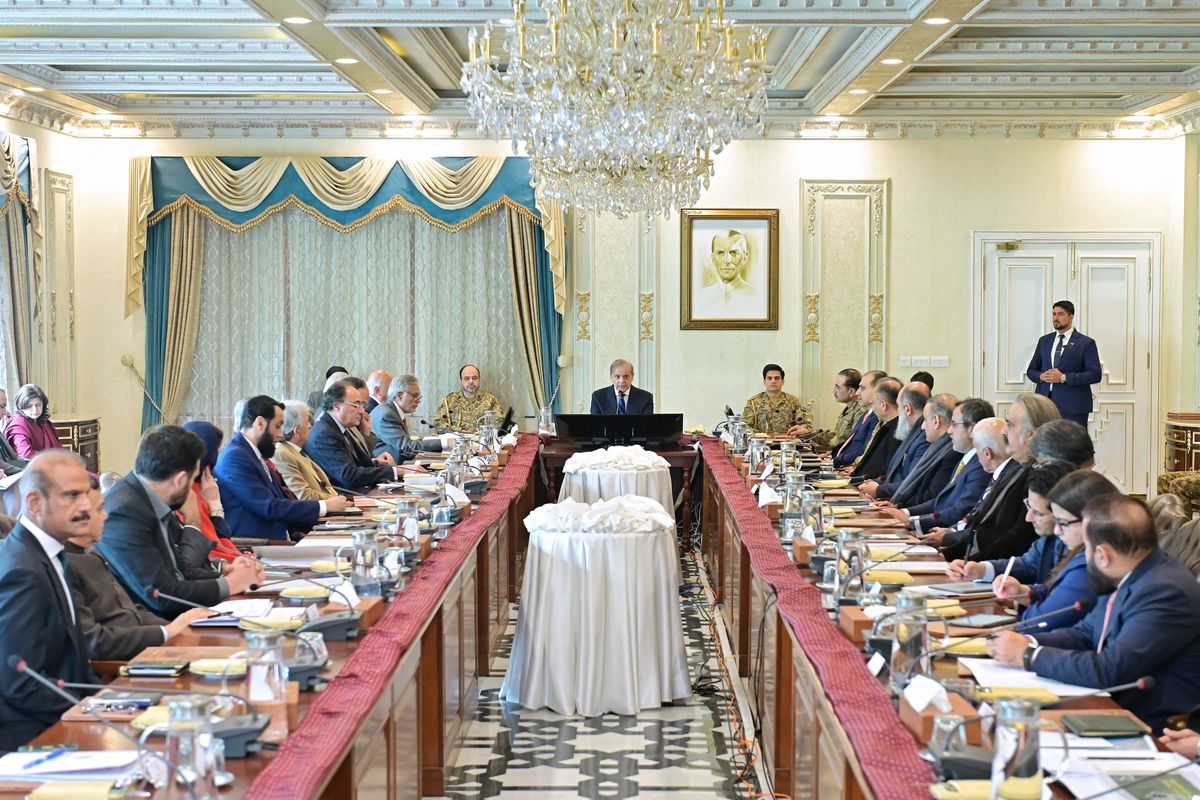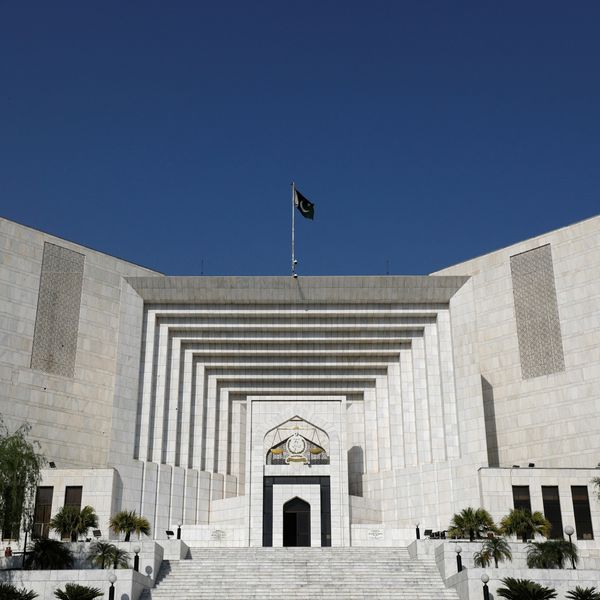Pakistan’s SIFC secures $2.3bn in foreign investment in first year
The joint civilian-military initiative reports $2.3bn in foreign investment, key reforms, and Gulf partnerships in its first year

Javed Hussain
Correspondent
I have almost 20 years of experience in print, radio, and TV media. I started my career with "Daily Jang" after which I got the opportunity to work in FM 103, Radio Pakistan, News One, Ab Tak News, Dawn News TV, Dunya News, 92 News and regional channels Rohi TV, Apna Channel and Sach TV where I worked and gained experience in different areas of all three mediums. My journey from reporting to news anchor in these organisations was excellent. Now, I am working as a correspondent with Nukta in Islamabad, where I get the opportunity of in-depth journalism and storytelling while I am now covering parliamentary affairs, politics, and technology.

PID/File
Pakistan's Special Investment Facilitation Council (SIFC) has recorded $2.3 billion in foreign investment during its first year of operation, according to official documents released by the SIFC Division detailing activities from July 2023 to June 2024.
The council, established on July 19, 2023, operates as a joint civilian-military initiative aimed at facilitating foreign investment, particularly from Gulf countries. Documents show 36 military officers working with the council on attachment, with their salaries continuing to come from the defense budget rather than through secondment or deputation arrangements.
The officers, who hold advanced degrees in fields including Economics, Engineering, Telecommunications, and Supply Chain Management, work alongside civilian officials in project planning and implementation across multiple sectors.
The council reports progress in agriculture, minerals, IT, telecommunications, energy, industry, tourism, and trade sectors. Notable developments include the commencement of a 150-megawatt solar plant in Sukkur and the signing of eight Production Sharing Agreements and Exploration Licenses for new blocks.
A 1.4 billion rupee transaction for the Heavy Electric Complex was completed in January 2024. The council has outlined privatization plans for several state-owned enterprises, including Pakistan International Airlines (PIA), First Women Bank, and various power distribution companies (DISCOS).
New initiatives include the E-Rozgar Program, which aims to establish 10,000 centers for IT exports, and the Pakistan Startup Fund, designed to provide equity-free capital for emerging businesses. The Solar Captive Power Project under FIEDMC has received preliminary approval.
International agreements and policy reforms
The council has implemented broad policy reforms, including a Land Information Management System targeting 10 million farmers and revised visa regulations allowing six-month visas to be issued within 24 hours.
Anti-theft power campaigns have recovered 85.7 billion rupees as of January 2024. The council has increased IT companies' export proceeds retention limit from 35% to 50% and approved a National Framework for Telecom Infrastructure sharing.
New regulatory bodies established include the National Seed Development & Regulatory Authority and Cannabis Control & Regulatory Authority. The council has also implemented reforms to IRSA through legislative amendments, introduced an Aqua Culture Policy for inland catch exports, and developed a Brownfield Refinery Upgradation Policy.
Additional measures include new regulations for RLNG supply to domestic consumers, a framework for battery storage, and WACOG implementation to address circular debt through adjusted gas pricing.
A comprehensive set of international partnerships has been formalized under the council's oversight. A joint venture between Pakistan Mineral Development Corporation and U.S.-based Miracle Saltworks Collective Inc. focuses on pink salt value addition.
Azerbaijan collaborations focus on energy sector projects, including a brownfield refinery, white oil pipeline, and joint trading ventures between PSO and SOCAR.
Bilateral engagements with Gulf states
A major investment conference in Islamabad on May 6, 2024, brought together 58 Saudi delegates, including 30 firms from sectors spanning IT, telecom, energy, aviation, construction, mining, agriculture, and human resource development. The conference facilitated meetings between these firms and 125 Pakistani companies.
In April 2024, Pakistan's Prime Minister held extensive discussions at the World Economic Forum with Saudi leadership, including the crown prince, ministers of finance, industries, investment, energy, climate, and economy and planning, as well as representatives from the Saudi central bank and Islamic Development Bank.
The UAE has signed seven memorandums of understanding covering food, agriculture, mining, energy, banking, wastewater treatment, and port operations. Kuwait has committed to seven framework agreements, including three major water sector projects: the Ghazi Barotha Hydroelectric project, minerals development in Chaghi, and Islamabad/Rawalpindi water supply.
UAE partnerships have expanded through initiatives with AD Ports and DP World in railways, maritime infrastructure, transit cargo systems, airports, and freight corridors. Federal Minister for Commerce Jam Kamal oversees UAE relations, while Federal Minister Aleem Khan manages Kuwait partnerships in power, mining, ports, banking, waste management, and logistics sectors.
Additional agreements with Kuwait encompass mangrove preservation, technology zone development, food security initiatives, and the establishment of a dedicated mining fund. The council reports that all agreements for the TAPI Project, including Host Government Agreement, Gas Transportation Agreement, and PSR, are scheduled for signing by March 2024.
Qatar has expressed interest in mines, minerals, livestock, and tourism sectors during the Prime Minister's October 2024 visit. The Commerce Minister has extended a formal invitation to the Qatar Business Association, with a comprehensive pitch book in development.
Significant Turkish investment expected
Turkish companies have established a significant presence in Pakistan's infrastructure and consumer goods sectors. Major projects include mass transit systems, waste management facilities, and consultancy services for hydropower projects including Dasu, Warsak, and Mohmand.
The acquisition of Dawlance Pakistan by Arcelik (KoC Holding) marked a significant investment in the home appliance sector. More recently, Hayat Kimya has established manufacturing operations for FMCG and hygiene products in Faisalabad's Special Economic Zone.
Turkish firms, including Coca-Cola İçecek Pakistan, Zorlu Energy, and Albayrak, continue to expand operations in Pakistan. Projects span motorways, toll roads, airport construction and management, with financing support from Turkish EXIM Bank. The council reports successful mediation of operational issues for several Turkish companies, including Hayat Kimya, Platform Turizm, and Zorlu.







Comments
See what people are discussing